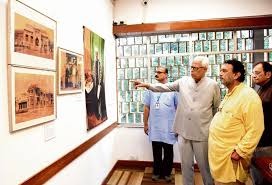NEW DELHI: Digitised copies of exquisite palm leaf and birch bark manuscripts, facsimiles of rare books and curated representations of the Mahabharata’s battle formations are few of the fascinating exhibits that went up for viewing at the India International Centre here on Friday.
The exhibition by Bhandarkar Oriental Research Institute (BORI), Pune, a leading centre of orientology, titled, “The Future of the Past”, was inaugurated by former Jammu and Kashmir Governor NN Vohra in the presence of IIC President Shyam Saran.
It marked the commencement of IIC’s seven-day Festival of the Arts, an annual feature, which seeks to bring communities at home and the world together through cultural exchanges.
Among the most striking exhibits on show is a depiction of battle formations of the Pandavas in the Mahabharata the Ardha Chandra Vyuha and Vajra Vyuha. These battle arrays show exactly where Pandava warriors Arjuna, Bhima, Nakula, Sahadeva, Abhimanyu and others were placed on the battlefield as they took on the Kauravas.
Inaugurating the exhibition, Vohra, IIC’s Life Trustee, said comprehensive national power stemmed from awareness about one’s cultural and civilisational past.
“These collections comprise the intellectual property of our country. The books, manuscripts are invaluable sources of knowledge, the very foundation of our civilisation,” said Vohra. He added that every effort to revive the national consciousness was a fascinating challenge and not easy.
“Today when we talk of preparing our country for discouraging foreign aggression by an enemy, we talk of national strength, comprehensive national power. This power arises from widespread awareness of our cultural past and contributes to a sense of unity in the midst of our enormous disparity. This consciousness brings us together,” said NN Vohra, reflecting on the significance of the exhibits.
Pradeep Apte of BORI, while introducing the show, said Critical Edition of the Mahabharata was the institute’s hallmark project. “It was based on careful selection of 754 manuscripts,” Apte said of the work that was released on September 22, 1966, by then President Sarvapalli Radhakrishnan.


